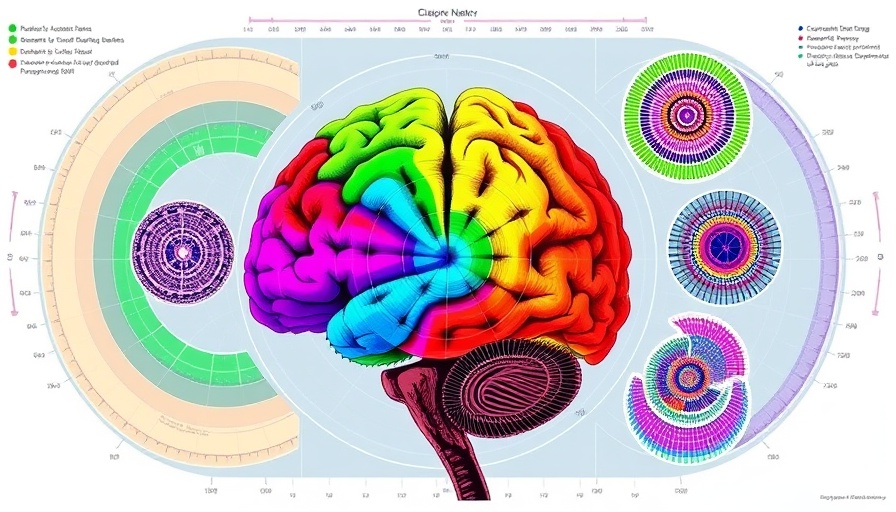
Understanding Caffeine's Impact on Sleep
Caffeine, the well-known stimulant found in coffee, tea, and various other products, has both avid supporters and critics, especially when it comes to its effects on sleep. If you struggle with sleepless nights, understanding how caffeine interacts with your brain while you sleep can be a game-changer. Recent research from Université de Montréal sheds light on the complex relationship between caffeine consumption and sleep recovery, particularly its effects on brain activity during different sleep phases.
Current Research Findings
The research team, led by Philipp Thölke, leveraged advanced AI and electroencephalography (EEG) techniques to explore the effects of caffeine on sleep in 40 healthy adults. The findings indicate that caffeine consumption—especially taken three hours before bedtime—can significantly alter brain activity. Notably, caffeine was shown to increase the complexity of brain signals, suggesting heightened alertness and chaotic brain states during sleep.
According to co-researcher Julie Carrier, although this heightened state can help foster alertness during waking hours, it unfortunately jeopardizes the quality of sleep during nighttime. “Caffeine stimulates the brain and pushes it into a state of criticality,” Carrier explains, highlighting the potential negative impact on relaxation and recovery during sleep cycles.
The Balance Between Chaos and Order: Why It Matters
Jerbi, another prominent figure in the research, likens brain activity to an orchestra—too quiet leads to inactivity, while too much chaos can result in disarray. This state of 'criticality' is crucial; it permits the brain to function optimally, balancing between focused processing and flexibility. When caffeine is involved, the brain operates in this heightened state, which can be beneficial by encouraging dynamic learning and decision-making. However, this balance becomes counterproductive when it exceeds into sleep hours.
Implications for Individuals with Sleep Disorders
For those grappling with sleep disorders, these findings present a significant concern. Consuming caffeine in the evening hours may prevent a restful sleep phase characterized by deep restorative cycles critical for memory consolidation. The study offers a pivotal insight: while caffeine has its benefits, moderation and timing are essential for maintaining healthy sleep habits.
Real-Life Experiences: The Struggle is Real
Many of you might find yourselves reaching for that cup of coffee or energy drink as a means to stay awake and alert, especially during those late study sessions or long work hours. However, as relatable anecdotes reveal, this daily habit can often clash with nighttime relaxation rituals. Those who consume caffeine close to bedtime frequently report tossing and turning, waking up groggy, or waking up multiple times during the night. Understanding the science behind why this is happening can empower you to make conscious choices about your caffeine intake.
Taking Control: Tips for Better Sleep
If you find that caffeine disrupts your sleep, consider setting a caffeine curfew. Aim to avoid coffee or caffeinated beverages at least six hours before bedtime, giving your brain the necessary time to wind down. Instead, replace that evening cup of coffee with herbal tea or decaffeinated alternatives that are known for their sleep-promoting properties.
Additionally, creating a sleep-friendly environment—keeping your room dark, cool, and quiet—can significantly improve sleep quality. Mindfulness practices and relaxation techniques, such as deep breathing or gentle stretching before bed, can also support a smoother transition into sleep.
Future Insights on Caffeine and Health
As we continue to uncover the interplay between lifestyle factors and health, this research encourages further investigation into how we can optimize our sleep without sacrificing productivity. Realizing that our daily choices can have long-term impacts offers a powerful perspective in managing our overall well-being.
A final takeaway: Knowledge is power, and understanding how caffeine affects your system can lead you to better choices and improve your overall quality of life.
So, if you're ready to embrace better sleep habits, consider your caffeine consumption. Take a step toward a more restful night and improved mental resilience today!
 Add Row
Add Row  Add
Add 




 Add Row
Add Row  Add
Add 

Write A Comment